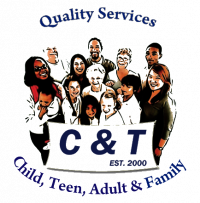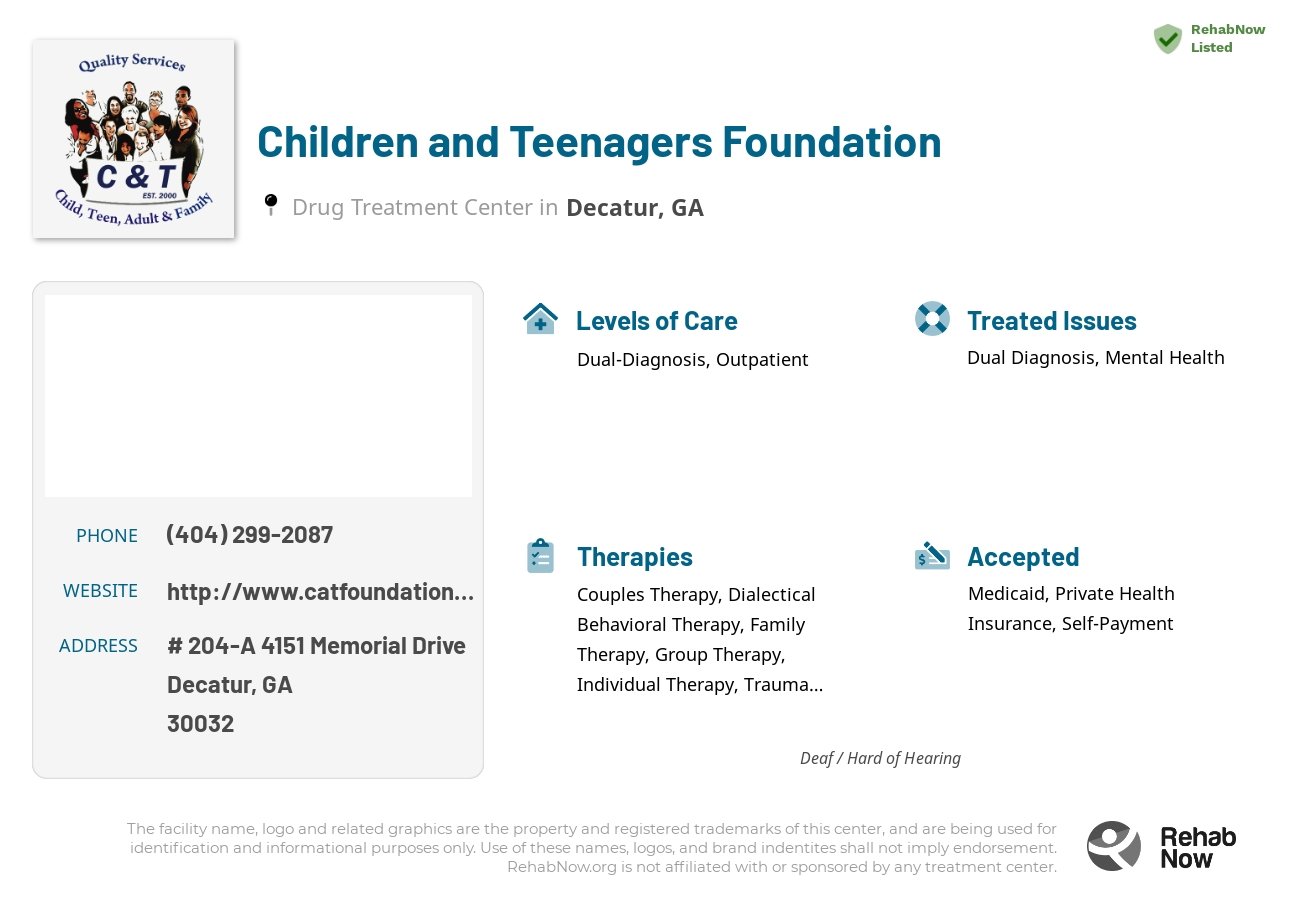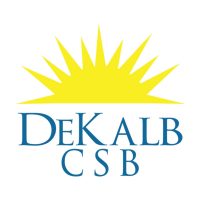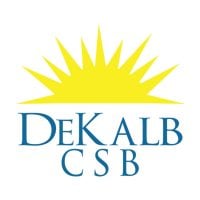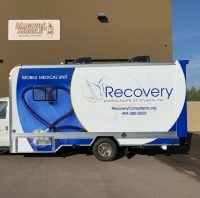Children and Teenagers Foundation
Drug Rehab Center in Decatur, Georgia
Children and Teenagers Foundation is a comprehensive mental health, substance abuse, and addiction treatment center in Georgia that offers family-centered services, specialized therapies, and aftercare support, all delivered by experienced professionals.
About Children and Teenagers Foundation in Georgia
Children and Teenagers Foundation in Decatur, Georgia is a comprehensive, multi-disciplinary center dedicated to providing the highest quality care to children, adolescents, and young adults with mental health, emotional and behavioral problems, as well as substance abuse and addiction. They offer family-centered, community-based services, with a holistic approach that focuses on healing the individual and the family. Their team is comprised of experienced professionals, including psychiatrists, therapists, case managers and substance abuse counselors.
At Children and Teenagers Foundation, they offer a variety of services for addiction and substance abuse, including education and intervention, individual and group counseling, life skills, relapse prevention, and aftercare support. They also provide specialty services such as Trauma-Informed Care and Dialectical Behavior Therapy. Additionally, they offer a number of family support services, in order to equip them with the tools and resources to provide effective care for their loved ones.
Children and Teenagers Foundation is accredited by the Commission on Accreditation of Rehabilitation Facilities and is a licensed treatment center in Georgia. They have also been awarded the Georgia Behavioral Health Partnership’s Approval Level System of Care Excellence Award for their commitment to providing quality care and services to those suffering from addiction and substance abuse. Furthermore, they are dedicated to working collaboratively between families and the community to ensure that their clients receive the best possible treatment.
Genders
Ages
Modality
Additional
Conditions and Issues Treated
When someone in struggles with both addiction and mental or emotional illness, this is considered a dual diagnosis. Dual diagnosis treatment can include therapy for these issues to happen simultaneously, which will allow either of them to be treated effectively.
Sometimes people who have suffered from addiction disorder also suffer from co-occurring disorders such as depression, anxiety, bipolar disorder, etc., making them “dual diagnoses.” Dual diagnoses require specialized treatment programs where drug and alcohol addiction are addressed along with psychiatric illnesses. Some rehabilitation facilities provide patients suffering from cooccurrences a program with highly integrated services and a clean environment with few distractions to help them succeed.
Levels of Care Offered
This center offers a variety of custom treatment tailored to individual recovery. Currently available are Dual-Diagnosis, Outpatient, with additional therapies available as listed below.
Outpatient treatment is often used for drug addicts in drug rehab. Outpatient treatment consists of counseling and therapy sessions. This form of treatment is also called ‘day-treatment’. The outpatient treatment process begins with the addict’s initial detox period, lasting about ten days.
Outpatient treatment is used for those who are at moderate risk for ‘slipping back’ into the addiction, for those who:
- Are not currently experiencing any side effects from withdrawal and can handle social pressure
- Can handle stressors that might trigger relapse
- Have a stable living environment or have moved out of their previous environment, which was not conducive to being sober
- Have a support system that allows them to go to a facility a few times a week while still keeping their current responsibilities
- Have no legal obligations, being either on parole or probation, that require them to seek treatment at a mandatory facility
- Are not currently experiencing any side effects from withdrawal and can handle social pressure
- Have a stable living environment or have moved out of their previous environment, which was not conducive to being sober
Therapies & Programs
Because no single treatment is effective for all addicts, the goal of treatment and therapy should be to figure out what works best for each individual. Tolerance and withdrawal levels differ from person to person, affecting the treatment intensity required. Addiction treatment should aim to help addicts develop healthy coping mechanisms for dealing with their addiction and its underlying causes.
Couples therapy works with clients and significant others in a professional capacity to improve relationship dynamics. This can be helpful for addicts who are trying to marry the idea of recovery into their work, family, social lives – any aspect that has to do with relationships. Through counseling sessions, addicts will have an opportunity to talk about their addiction with professional partners.
Family therapy is beneficial for people who are in addiction treatment services because it offers addicts the opportunity to work with their family members to better understand what led them to make choices that contributed to their addiction.
This type of therapy helps family members reach a deeper understanding of how they can best support their loved one during recovery. It also helps the addict better understand their own motivations and triggers that led them to turn to substance abuse.
Family therapy can help addicts in the following ways:
- Assists family members in processing difficult feelings so they don’t blame or resent recovering addicts
- Assists family members in understanding how addiction has impacted the addict and everyone who is involved with them
- Allows the addict to take responsibility for their actions, while encouraging improved communication skills
- Helps family members understand how to best support an individual in recovery so addicts don’t relapse again.
Group therapy can help build a stronger support system and give addicts in Decatur, GA insight into their addiction that they gain through shared conversations. Group therapy occurs in a controlled group environment, exclusive of one on one meetings. This makes it safer for patients to feel comfortable sharing the struggles they’re going through and gaining perspective.
Trauma therapy is beneficial for people who are recovering from drug addiction because it helps them heal from past traumas that may have caused them to turn to harmful substances or led them to experience negative emotions that contributed to their destructive behaviors.
This type of treatment works by processing difficult experiences so individuals can learn how to process these events without having to turn to substances for coping.
Trauma therapy can help addicts in the following ways:
- Helps individuals understand their experiences and emotional responses to difficult events, including why they turned to drugs or alcohol
- Provides them with comfort and support while working through difficult emotions related to these traumatic experiences
- Offers an opportunity for addicts to have a voice and be heard, which can improve their self-esteem
- Can help them develop coping skills so they can better respond to triggers instead of turning to substance abuse.
Dialectical Behavior Therapy (DBT) is a cognitive-behavioral therapy that helps patients understand the relationship between their thoughts, feelings, and behaviors. It is beneficial for those whose addictions and behaviors stem from severe mental health issues. The term “Dialectic” means the integration of opposites. In substance abuse, DBT refers to accepting the patient’s addiction and working to change their thoughts and behavior. It improves life skills such as controlling intense emotions without reacting impulsively, resolving interpersonal conflicts effectively, and promoting awareness about self and others.
Cognitive-behavioral therapy is a technique that is used to help people with addiction. Specifically, it is a way of identifying thoughts and behaviors that cause the addiction. It is typically used in an individual counseling session.
The content explains cognitive behavioral therapy and how it works to address some behaviors that may be leading to unintended consequences in their life, as well as its benefits for those seeking sobriety.
It works by helping people to talk through their issues and addressing the thoughts that cause said behaviors. It is an excellent way of learning about oneself and one’s perception of the world.
Payment Options Accepted
For specific insurance or payment methods please contact us.
Is your insurance accepted?
Ask an expert, call (888) 674-0062
Additional Details
Specifics, location, and helpful extra information.
Decatur, Georgia 30032 Phone Number(404) 299-2087 Meta DetailsUpdated November 25, 2023
Staff Verified
Children and Teenagers Foundation Patient Reviews
There are no reviews yet. Be the first one to write one.
Decatur, Georgia Addiction Information
Prescription opioid use has caused a large increase in the total amount of overdoses in Georgia. Almost 12% of the Georgia population uses illicit drugs each year, and slightly over 3.5% also abuses alcohol at the same time. This does not include those who binge-drink at least once a month, which includes 20% of all Georgians.
The National Institute on Drug Abuse says drug abuse and addiction are major problems in Decatur, Georgia. There are over 25,000 admissions to treatment facilities for drug and alcohol abuse in 2016. An estimated 330,000 people are living with opioid addiction in the city. Decatur, GA, has a lot of resources for those who are in recovery. There are many Alcoholics Anonymous and Narcotics Anonymous meetings and 12-step support groups.
Treatment in Nearby Cities
- Douglas, GA (176.4 mi.)
- College Park, GA (14.0 mi.)
- Morven, GA (200.5 mi.)
- Washington, GA (86.9 mi.)
- Columbus, GA (100.1 mi.)
Centers near Children and Teenagers Foundation
The facility name, logo and brand are the property and registered trademarks of Children and Teenagers Foundation, and are being used for identification and informational purposes only. Use of these names, logos and brands shall not imply endorsement. RehabNow.org is not affiliated with or sponsored by Children and Teenagers Foundation.
